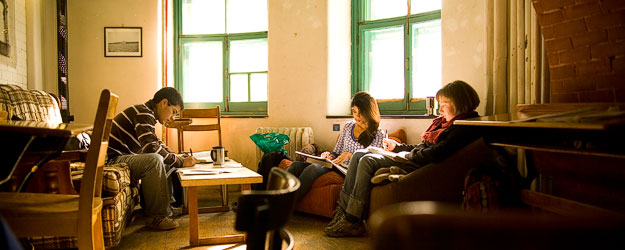The Students’ Society of McGill University (SSMU) has halted plans for the creation of a student-run café due to concerns about the financial feasibility of the project. SSMU executives say they are currently looking into alternate plans for a unique student space in the SSMU building.
The student-run café project was first proposed in 2011 as a response to the closing of the Architecture Café in Sept. 2010, and was set to open in the fall of 2013. The original leader of the project, former SSMU Vice-President Finance and Operations Shyam Patel, said that SSMU conceived the café concept with the intention of creating more student space and jobs on campus.
“I personally liked the idea of a café space because it bridges the gap between the classroom experience and practical experience for many students,” said Patel, who has not been involved in recent decisions. “A student-run café would encourage the participation of students at a managerial level, and would provide much needed practical experience regardless of a student’s program.”
According to current SSMU Vice-President Finance and Operations Jean Paul Briggs, however, the plans to create a student-run café are complicated by an existing eight-year contract with La Prep, which states that no other food service in the building is permitted to sell specialty coffees and teas.
“[This] is problematic because it limits the offerings of the [student-run] café,” Briggs said. “In addition, there are already seven food services in the SSMU building … it would be very hard for the [student-run] café to compete and differentiate itself [with respect to] price, quality, or variety.”
In addition, the building is already at full occupancy, meaning that SSMU would have to evict a current tenant to create space for the new café. According to Briggs, this means the new café would have to make up for the lost revenue from that tenant—as well as the financial demands of renovating the space and buying the necessary equipment—in order to remain financially sustainable as an operation.
While SSMU could potentially locate the café outside of the SSMU building, Briggs was not optimistic about the practicality of such a project, based on previous student ventures like Haven Books.
“They don’t work because they are [constantly] changing management [and] employees year-to-year,” he said. “There’s very little continuity and institutional memory, and that leaves it as a very risky and troublesome opportunity for us to pursue.”
Despite these challenges, Briggs said he will pursue the project’s original goal to create a unique student space in the SSMU building, with the assistance of the students involved in last March’s sustainability case competition—an event in which teams presented their design for the café to a panel of judges.
“We want to use the creative and dedicated people who put so much time and effort into the case competition to develop an idea for a new, unique student space that meets the ideals that were set forth,” Briggs said. “I think there are many ways within that framework that we could satisfy those needs, and do something really useful without jeopardizing our operational feasibility.”
Patel expressed some concern over the stalled plans. He said that the Operations Management Committee explored these financial concerns last year, and that the limitations cited by Briggs would extend to any attempt to create student space in the building. However, he explained that there is still value in pursuing the development of a space for students.
“Any form of student space is beneficial … however, there needs to be an emphasis on student-run space rather than space for students,” Patel said. “There are many spaces that can be used and accessed by students on campus, however, students do not necessarily have the opportunity to be a part of the decision-making process in regards to how the space should be managed, used, and developed.”
These changes in plans will have the most immediate impact on the members of Fireside Café—the team that won the SSMU sustainability case competition last year, and whose design was supposed to be adopted for the student-run café. Rebecca Rosenthal said she and her team are looking forward to discussing the feasibility of the project with those involved in the decision.
“Throughout our experiences during the competition, we witnessed students, faculty, [and] administration [as they] worked harmoniously towards a common goal, and how this collaboration can lead to mutually beneficial gains,” Rosenthal said. “We hope to continue working with SSMU and many others to ensure that decisions with far-reaching impacts on student lives are made in the best and most inclusive way possible.”








This is incredibly disappointing.
Pingback: Students share ideas for newly open space in SSMU building - McGill Tribune